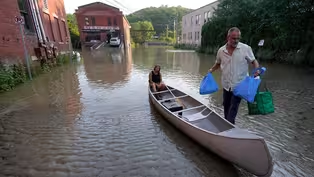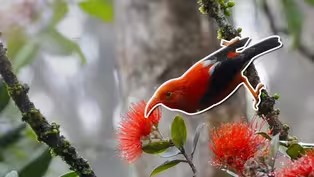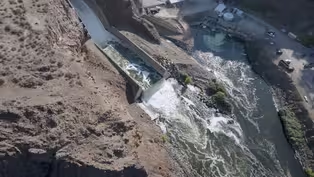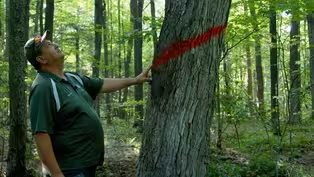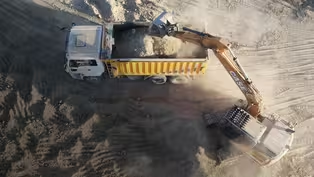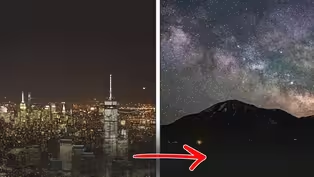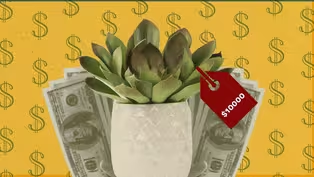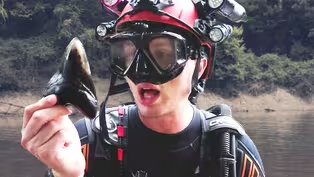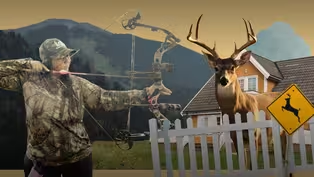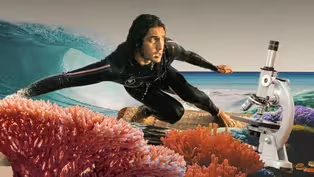
Understory | Rock Climbing's Troubled Route Naming Tradition
Special | 8m 48sVideo has Closed Captions
Baratunde meets a rock climber who is working to diversify the sport.
Baratunde Thurston meets Favia Dubyk, an avid rock climber who has been bouldering for over a decade. However, as a black woman, climbing hasn't been easy. Favia discusses the problematic route names and other aspects of the sport that have created unwelcoming environments for people like her, as well as, how the climbing community is working to make the sport more inclusive for all.
Problems playing video? | Closed Captioning Feedback
Problems playing video? | Closed Captioning Feedback
Major support is provided by Anne Ray Foundation, a Margaret A. Cargill Philanthropy and the Richard King Mellon Foundation. Support is also provided by John and Ruth Huss, Susan and...

Understory | Rock Climbing's Troubled Route Naming Tradition
Special | 8m 48sVideo has Closed Captions
Baratunde Thurston meets Favia Dubyk, an avid rock climber who has been bouldering for over a decade. However, as a black woman, climbing hasn't been easy. Favia discusses the problematic route names and other aspects of the sport that have created unwelcoming environments for people like her, as well as, how the climbing community is working to make the sport more inclusive for all.
Problems playing video? | Closed Captioning Feedback
How to Watch America Outdoors with Baratunde Thurston
America Outdoors with Baratunde Thurston is available to stream on pbs.org and the free PBS App, available on iPhone, Apple TV, Android TV, Android smartphones, Amazon Fire TV, Amazon Fire Tablet, Roku, Samsung Smart TV, and Vizio.
Buy Now
Providing Support for PBS.org
Learn Moreabout PBS online sponsorshipMore from This Collection
How does our country’s diverse landscape shape our experience of the outdoors? That’s the central question behind the new PBS digital series, America Outdoors: Understory. Join host, Baratunde Thurston, as he explores the unexpected places and ways Americans encounter nature, and how their time outside is impacted by climate change, equity, access, outdoor culture and more.
Understory | Climate Change's Effects on Vermont Flooding
Video has Closed Captions
Discover the science behind this summer’s historic and devasting floods in Vermont. (13m)
Understory | How Engineered Mosquitos Could Save Birds
Video has Closed Captions
Discover how bacteria could be the key to stopping mosquito-borne illnesses. (11m 37s)
Understory | Can Dam Demolition Save California's Salmon?
Video has Closed Captions
What happens when you remove dams that changed the Klamath River a hundred years ago? (11m 54s)
Understory | Can Ancient Wisdom Save the Forests?
Video has Closed Captions
Forests are in trouble, but could ancient wisdom be the answer to saving our trees? (11m 54s)
Understory | We’re Running Out of Sand
Video has Closed Captions
Sand may seem unremarkable, but the modern world is built on it and we’re running out. (13m 7s)
Understory | The Movement to Save Our Night Skies
Video has Closed Captions
Explore one small town’s mission to save the night sky and help migrating birds. (12m 59s)
Understory | How the Houseplant Boom Fueled Plant Poaching
Video has Closed Captions
Baratunde meets a plant parent who is bringing awareness to the issue of plant poaching. (7m 31s)
Understory | The Fossil Hunter Uncovering Florida’s Past
Video has Closed Captions
Baratunde meets a Florida fossil hunter and learns how this hobby contributes to science. (9m 11s)
Understory | Meet the Suburban Deer Hunters of Long Island
Video has Closed Captions
Baratunde meets a female suburban bowhunter to discuss how the sport is changing. (8m 35s)
Understory | The Scientist Surfing to Fight Climate Change
Video has Closed Captions
Baratunde meets a surfer scientist in Hawaii who is trying to protect the corals reefs. (10m 6s)
Providing Support for PBS.org
Learn Moreabout PBS online sponsorship- [Favia] When I see rock, I see happiness.
I never thought I would have this sort of relationship with the outdoors.
- Rock climbing is a sport that tests your body and your mind.
In the last few years, rock climbing has entered the mainstream, and for the first time in 2020, it was an Olympic sport.
This explosion in popularity means that more people are trying it than ever before.
But that doesn't mean that everyone has access to the sport.
- There was a time that I didn't go for a year because I was getting so many threats.
Everyone deserves to be safe and feel safe when they're climbing.
- [Baratunde] There are folks in the climbing community who are dedicated to making the sport better and more accessible for everyone, and they're doing it around the country, one climb at a time.
(gentle music) This is Favia Dubyk.
She's a professional rock climber and has been bouldering for a decade.
When she's not climbing, she's a physician, coach and writer.
- This is engaging my lower back.
- [Baratunde] But on the rocks is where she most wants to be.
- [Favia] I found climbing just through luck.
I didn't know rock climbing was a thing my entire life.
I tried it and I fell in love instantly.
- So what part of that first experience rose to the level of instant love for you?
- I love the sound of my shoe and my hands hitting the rock, but there's nothing like the puzzle.
In climbing, there's lots of pieces to that puzzle.
One is safety.
The climbing part is the best part of the puzzle because there's many ways to do a climb, and you have to figure it out.
I love that sense of there's only one thing that's important at that time, and it's making the next move.
That's the only thing that counts.
And I have to be very confident and sure about every movement I do because my life is at stake.
The fear, the excitement, I love all of it.
I did have to take a break 'cause I was diagnosed with advanced stage cancer in 2012, and I said, "If you survive this, that's what you're gonna do.
You're gonna get back on the rock."
And that's what I've been doing.
- What a promise to make and keep with yourself.
- [Favia] It's simple.
I think joy brings more of the, the deep, deep happiness I feel when I climb.
- [Baratunde] And for hardcore climbers like Favia, even though she does it as a solo sport, it's also about community, bonding with other climbers and being with other people who are also obsessed with rocks.
- [Favia] Rock climbing requires trust.
I'm here to trust that my spotter will catch me.
I started noticing that people wouldn't even recognize my presence in the group.
Well, either you get ignored or sometimes it's been hostile.
How can you even trust if you're not even feeling welcomed in your community?
- [Baratunde] Rock climbing got its start in the 1880s, and as the sport grew, the ways you could participate grew as well.
But despite the diversity of types of climbing, there's still a stubborn lack of diversity when it comes to type of climber.
A recent report found out that of the 7.7 million climbers in the US, less than 15% identify as a person of color.
- [Favia] It has definitely been a big source of turmoil in my climbing career.
I check the parking lot for the vehicles.
And so that way someone can keep track and have a suspect list.
(laughs) But this is part of my ritual as a Black female.
- Wow.
Thank you for sharing that.
You're peppering it in with a little laughter, not 'cause it's funny, I assume, 'cause it's absurd and painful.
- Yes.
- Now this is hardly a new problem.
For many years, keeping folks of color away from outdoor spaces, that was the law.
National parks in the Jim Crow South, including Shenandoah National Park and the Great Smokey Mountains National Park were segregated spaces until the Civil Rights Act of 1964.
- For my first few years as a climber, I just didn't know any spaces.
I didn't know any people.
I was the only Black person.
Felt like, oh, there's probably one per state or something.
- Today, public outdoor spaces are still overwhelmingly white.
According to the National Park Service's own data, 77% of all visitors to national parks are white.
Only 6% are Black.
There's also a long tradition of climbing routes being named by the first ascensionist.
- To name a route, it's named by the first person who climbs it, who successfully goes from the bottom to the top.
- [Baratunde] The names often reflect the rock formation or the location.
Think of The North Face.
Others even reference pop culture.
"Sharknado," for example.
And then there are route names I'll generously refer to as unwelcoming.
Tar Baby, Panty Wall, The Whipping Post, there are a lot more like these all over the country.
Some are so bad I can't really say them here.
- A lot of places where I climb, there are racist names, but there's really, really more sexist names.
- Are there any safe-for-work examples you can share?
- I think so.
- [Baratunde] Go for it.
- Pumped Full of Semen, Daily Dick Dose.
(chuckles) - (sighs) It's so exhausting.
(upbeat rhythmic music) - [Favia] Welcome to "Rock Matters."
On today's episode, we're going to discuss the Olympics - [Molly] Rooting, which is a really cool training technique.
- [Baratunde] Climbers like Favia are making sure everyone has access to the sport.
- When I first started, I was just trying to survive.
I was out there alone trying to learn climbing, learn the outdoors.
- Favia, what's your thoughts on the kneebar pad?
- [Favia] First, let's discuss what a kneebar pad is.
And so I help other people climb better in a safe community, and I travel the country teaching those clinics.
- Climbers have also been sounding the alarm that routes with names like Aryan Race have to change.
- There are online guidebooks that we now have flagging systems that we can say like, "Hey, that's inappropriate."
But even on our own, if you can't change it, you try to abbreviate it so you don't have to say that really inappropriate thing all the time.
- It's like saying "the N word" instead of saying the N word.
- [Favia] Exactly.
So that's what we're doing now until books can be republished.
- [Baratunde] And in 2021, 50 offensive route names in West Virginia were changed, including Aryan Race.
The new names were published in the new addition of the climbing guidebook, "New River Rock."
The Whipping Post route name in Colorado was also renamed to Black is Beautiful.
For the ones that have been changed, I assume the changing the name didn't destroy the rock.
- Exactly, exactly.
When I speak up about racism, I get more back.
So I think that's why these names just go unthought of, 'cause people are too afraid, don't know how to fix it, and then there's the few that really wanna stick with it.
- [Baratunde] Meanwhile, organizations like Brown Girls Climb, Flash Foxy and Melanin Base Camp are raising awareness of the discrimination within climbing, while also creating supportive and safe environments, not just for climbers of color, but for women and the LGBTQ community as well.
- We're all fighting the same fight, and it's for us to come together and to... We can talk about our experiences without having to explain why that's racism.
That's the most exhausting part.
So, the people of color who are climbing or the Black people who are out there, just showing up, it's helping other people see that it's for everyone and everybody.
- [Baratunde] In the face of such hostility, what is so worth it for you to keep going back?
- [Favia] I love climbing and I wasn't gonna let them take that joy from me.
I definitely wasn't gonna lose the thing that wakes me up, that keeps me going.
Then they would win, and I'm not gonna allow for that.
(chuckles) - [Baratunde] I've been a Black person in very non-black, very white spaces, I've been a poor person in very wealthy spaces, and I know that unwelcome feeling.
I also have felt the sense of fear from those who've historically participated in the space, that I'm there to take something from you.
I hope if there's someone out there who's afraid, that it's really not about stopping people from engaging in their joy and in their sport and in their relationship with the outdoors.
It's about making that relationship possible for more people.
- [Onlooker] Wow, that's crazy.

- Science and Nature

Explore scientific discoveries on television's most acclaimed science documentary series.

- Science and Nature

Capturing the splendor of the natural world, from the African plains to the Antarctic ice.












Support for PBS provided by:
Major support is provided by Anne Ray Foundation, a Margaret A. Cargill Philanthropy and the Richard King Mellon Foundation. Support is also provided by John and Ruth Huss, Susan and...
